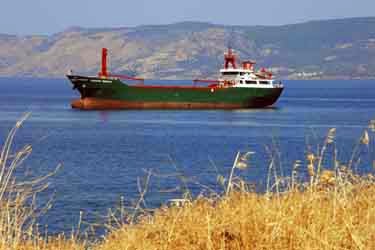In Greece on March 25 Independence Day is celebrated: the day that the war for freedom started, a fight to get rid of the Ottomans. Lesvos however had to wait many more years before she was liberated, in 1912.
There is not much documentation about the period during which the Lesvorians had to obey the Ottoman pashas who ruled the island. After the first battle for freedom was lost on Lesvos, the Ottomans confiscated a big lake near Agiasos (Megali Limni) and forced the people from Agiasos to drain it and turn it into agricultural land where they then had to work. The people from Lesvos also were put to work after 1850, when most of the trees died on the island after a very severe winter. Life was not so pretty under the Ottomans, but there were some advantages.
At the end of the 19th century and at the beginning of the 20th century the island (and the Turkish coast opposite Lesvos 12 miles away, around the coastal towns of Ayvalik, Edremit and Dikili, where many Greeks lived) began to prosper, thanks to the increase in olives and the growth in international commerce. Mytilini became an important transit port for goods to Marseille, Alexandria, Smyrna, Istanbul, Triest, Odessa and Rostov: a late Golden Age for the island, making Mytilini a swinging international commercial town. The welfare ended when Lesvos was freed by the Greek army in 1912 and the Ottoman empire started its fall, to be ended after the Greek – Turkish war of 1919 – 1922. When the war finished there was a huge population exchange; Lesvos got 30,000 new inhabitants from Asia Minor (about 10,000 Muslims where deported from the island) and prosperity soon dwindled. The island again became dependent on agriculture and the islanders could just barely survive. The centuries’ long connection with the Turkish mainland was broken and the island became isolated and dependent on faraway Athens.
The frontier was not totally closed, because plenty of smugglers operated: camel manure was brought to the island for the olive trees and (secretly) olive oil and soap was sold to Turkey. Fish and fishnets were exchanged for sheep and dynamite (used for fishing purposes). There were also secret expeditions from some of the island inhabitants who had been forced to flee so quickly their homes in Turkey, they had to return to dig up gold coins, icons and other treasures that they had hidden. In this way they met up with old friends and neighbours and after the first illegal trips, others followed. When the Germans occupied the island during World War II there was food shortage and many an islander’s hunger was stilled by food smuggled from Ayvalik.
It was only in September 1955, when in Istanbul there were pogroms against the remaining Greek minority (and Armenians and Jews) that mistrust against the Turks increased (and even more when the Turks invaded Cyprus in 1974). By then all the borders were hermetically closed by the Greek Junta. Although according to a custom official even in those times, 30 to 40 cows were weekly smuggled to the island. The borders opened a bit for commercial purposes in 1975, when sardines, tuna, sheep, goats and cows could be negotiated.
A long enduring mistrust between neighbours is a shame. In 1980 the mayor of Dikili invited the mayor of Mytilini to attend a cultural festival. So the exchange started up again between Lesvos and Turkey: first with the dignitaries on both sides who attended all kind of events and then slowly the citizens followed, even the children were sent to holiday camps at the other side of the border.
In 2005 lots of Greeks lost their mistrust of the Turkish people. This happened thanks to a Turkish tv-series! Ta Synora tis Agapis (Borders of love; Turkish titel Yabanci Damat: Foreign Groom). It was about a Turkish girl, Nasli, who fell in love with a Greek boy, Nikos. Both extended families tried to interfere in the couple’s proposed marriage. Turks as well as Greeks spent many evenings in front of the television enjoying this drama, and many discussions followed. Lots of Greeks had to admit that there was much to recognize in the Turkish family: there is not so much difference between a Greek and a Turkish family.
Nowadays the circulation between the island and the Turkish coast is much the same as before the war; daily there are boats going to and from Turkey. Because prices in Turkey are low, the Lesvorians go to buy lots of stuff on the other side. But Turks also come to the island, to enjoy its beauty and quiet nature. It is not easy for all Turks to get a visa, otherwise Lesvos would be overrun with Turkish tourists.
The borders are open, but there still is smuggling. Even though the Lesvorians have made up with their Turkish neighbours, elsewhere in the world new enemies are made and disputes keep happening and Turkey is now flooded with refugees from Asia and Africa. And they cannot use the ferry between Ayvalik and Lesvos. For ridiculously high prices, they have to risk crossing over in rickety little boats. Here on Lesvos it is not yet Lampedusa, where refugees arrive by thousands, but lately the refugee numbers have increased alarmingly and the spare clothes, given by the islanders to the many wet arrivals are about to run out. New ways have to be found to provide humanitarian help.
It will not be easy to find a solution for the problem of the refugees. But the suggestion of a Dutch politician that Europe should close all its borders to refugees is ridiculous. Clearly this man has never lived at a frontier: borders are there to be crossed, like they have been doing that for centuries on Lesvos.











